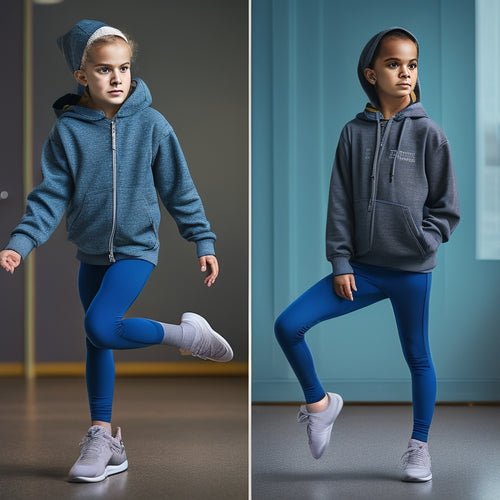
Parental Guide: Nurturing Young Dancers Effectively
Share
As a parent, playing an active role in nurturing your child's dance journey is vital for their technical growth, emotional well-being, and overall development as a young dancer. To set them up for success, make sure they have a thorough understanding of their dance schedule and attire, and provide healthy snacks for energy. Foster a supportive community by offering emotional support, open communication, and positive reinforcement. By doing so, you'll help your child build confidence, develop their skills, and thrive in their dance journey. By exploring these essential elements, you'll discover the secrets to nurturing a successful and happy young dancer.
Key Takeaways
• Provide technical instruction and emotional support to help young dancers build confidence and master dance skills.
• Foster open communication to understand your child's needs, goals, and concerns, and address them promptly.
• Create a supportive community by encouraging teamwork, mutual respect, and positive relationships among dancers.
• Offer positive reinforcement through constructive feedback, praise, and rewards to motivate young dancers to improve.
• Stay involved in your child's dance journey by attending performances, providing feedback, and celebrating their achievements.
Dance Essentials for Success
To guarantee a successful dance experience, it's essential for parents to be aware of and prepare their child with the necessary dance essentials.
This includes:
- A thorough understanding of the dance schedule and attire
- Proper hair styling
- Healthy snacks to maintain energy levels
Familiarize yourself with the weekly schedule, including class start times and required dance attire, such as specific shoe types and clothing. Make sure your child's hair is styled appropriately for each class, and pack essential items like hair bands or ponytail holders in their dance bag.
Additionally, provide healthy snacks and water to maintain energy levels throughout the class.
Nurturing Young Dancers Effectively
Effective nurturing of young dancers requires a multifaceted approach. It encompasses not only technical instruction but also emotional support, open communication, and a supportive community. By providing positive reinforcement and consistent communication, parents can help build confidence and foster growth in their child.
This can be achieved by offering regular encouragement, asking questions, and staying engaged with the dance studio. Open dialogue and prompt communication of concerns can also help create a supportive environment. By doing so, parents can empower their child to develop a strong foundation in dance, while also promoting a lifelong passion for the art form.
Supporting Their Dance Journey
As young dancers begin their artistic journey, parents play an essential role in providing the necessary support and encouragement to help them navigate the challenges and triumphs that lie ahead. Parental involvement is vital in building confidence and dedication in young dancers. By offering positive feedback, staying informed about upcoming events, and attending performances, parents can foster a sense of accomplishment and motivation.
Encouragement from parents can help young dancers stay committed to their craft, even in the face of setbacks or disappointments. By being actively involved in their child's dance journey, parents can help build a strong foundation for their child's artistic growth and development.
Frequently Asked Questions
What Is the Ideal Age to Enroll My Child in Dance Classes?
The ideal age to enroll your child in dance classes depends on their developmental readiness, as early as 2-3 years old, when they can benefit from social interactions and basic physical awareness, fostering a lifelong love for dance and movement.
Can I Watch My Child's Dance Classes From the Studio?
"Observe your child's dance class from the studio, if allowed by the instructor, to promote Studio Etiquette and reap Observation Benefits, such as enhanced learning and strengthened parent-child bonds, while respecting the dance environment."
How Do I Handle My Child's Disappointment After a Poor Performance?
"When a storm cloud of disappointment darkens your child's dance horizon, guide them towards building resilience by managing expectations, focusing on progress, and celebrating effort, not just results, to help them weather the setback and shine again."
Can I Request a Specific Dance Teacher or Class Time?
When requesting a specific dance teacher or class time, consider studio preferences, scheduling conflicts, teacher chemistry, and class dynamics to guarantee a harmonious and productive learning environment that fosters your child's growth and development.
What if My Child Wants to Quit Dance Classes Mid-Season?
When a child wants to quit dance classes mid-season, it's crucial to recognize burnout signs and avoid parental pressure, allowing them to recharge and rediscover their passion, rather than forcing them to continue, potentially leading to long-term disinterest.
Related Posts
-

What's Holding Back Your Online Dance Makeup Empire?
You've poured your heart into building your online dance makeup empire, but it's stuck in neutral. What's holding you...
-

Dance Moms' Must-Have: Stylish College Hoodie
As a dance mom, embracing a lifestyle of comfort and style is essential, and that's where the must-have stylish colle...
-

Moo! Unveiling Latin Dance Culture Sensation
Latin dance culture is a vibrant phenomenon that embodies the essence of identity, community, and self-expression, re...


